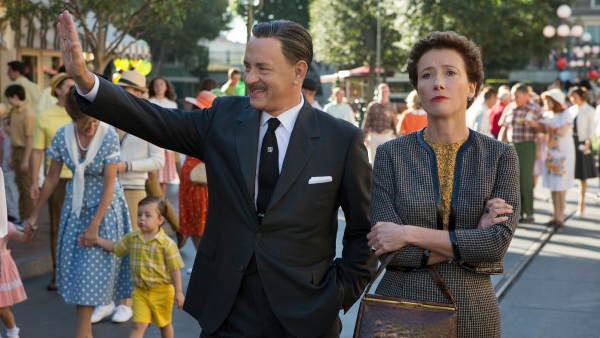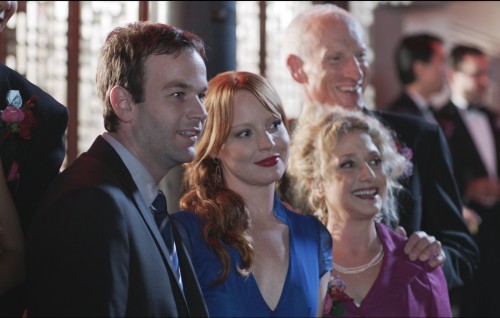A spoonful of sugar, as they say, helps the medicine go down. In the case of Saving Mr. Banks, John Lee Hancock needn’t any help coaxing people to eat up his charming quasi-biopic. But still, that idea of needing something to sort of grease the rails to get a job done really captures the spirit and the idea of the entire film itself and does make the film so much more palatable. On the surface it’s fun to see the crotchety British writer thumb her nose at Disney’s candy-coated empire, but there’s so much more to it than that.
Now Saving Mr. Banks, despite the appeal and allure of one Walt Disney (played oddly but convincingly by Tom Hanks), is very much if not entirely about P.L. Travers. It’s a gem of a film, as this “story behind the story” about adapting Mary Poppins into a feature film is filled with everything that makes movies work. Terrific casting, wonderful visuals and cinematography, and Thomas Newman’s bouncy music are all wrapped around a story worth telling and a true one to boot.
For almost 20 years Walt Disney courted Ms. P.L. Travers trying to make Mary Poppins into a film. Travers, near the end of her financial rope, begrudgingly agreed to go to L.A. to collaborate on the adaptation – she retained the rights and had final say on everything lest she would pull the plug. Thankfully, it all worked out despite the film’s untold but famously conflict-laden genesis.
John Lee Hancock’s film plays a like photo album that tells its story as a collection of short scenes and cherry picked high points instead of focusing on heavy or needlessly drawn out events. That gives more of a just the facts version of the actual process which keeps it from getting into or bogged down by the minutia. It also allow a looks at her life in retrospect to simultaneously tell who Travers was, which ultimately explains the bitter Brit’s disposition. But even the happiest place on earth has nothing to soften Travers’ demeanor.
Friendly greetings by a limo driver are dismissed by Travers who believes Los Angeles smells like chlorine and sweat and even a Disney-fied welcome basket can’t escape the wrath of Travers’ criticisms and resentment of the saccharin coating on Walt’s Empire. Thompson is extraordinary as Travers who, aside from comically cold retorts and quips, effortlessly wears Travers’ personal pain, loss and sorrow so realistically and convincingly.
Travers has hubris and serious opinions about her creation and so while Disney looks at things half-full, Travers is content to break the glass and watch someone else cry over spilled milk. The creative differences adapting Mary Poppins abound and nearly derail the production many times, but Walt sure had his patience tested as he and his cabinet of equally happy and passionate staff do their best to cope with the cantankerous Travers. Emma Thompson is just divine in her stern and no nonsense portrayal and the two argue like an old married couple; nothing is spared her opinion as she is steadfast on having this story told well and, above all, not become a musical.
Tom Hanks, as always, owns the role and as founder of the Mouse House it’s surprising that it’s at least 20 minutes before he shows up. Truth be told he doesn’t wear the role very well and at first comes off like John Wayne playing Genghis Khan. (Yeah, check IMDB, it really happened.) He doesn’t quite look the part, or sound the part yet Hanks’ charm has its own facade that no makeup could rival. He plays Walt so very well, a perfect contrast to Travers, and maintains an even-keel even when Travers is highly unreasonable. His warmth and delivery are repeatedly genuine (would you expect any less from Hanks?) and none more so than the tender exchange he and Thompson share about her precious Mary Poppins near the end of the film.
Bringing all this wonderment together is John Lee Hancock (The Blind Side). A heartfelt and feel-good filmmaker, he brings to the screen not just a barrage of vintage-looking visuals but genuine and uncompromising warmth. A lot of that has to do with the set design but its the supporting cast that brings it home; from Paul Giamatti to B.J. Novak and Jason Schwartzman, even Bradley Whitford, their small but memorable turns add magic to the story. As a group they put up with Thompson, who again is exceptional, but Walt brought them all into this and he’s the one who has to pick the battles with Travers in the adaptation process. He comes close to losing his cool time and again but it’s inspiring to see the lovable Walt (spending 24 hours in a full suit no less) as a person who demands perfection, only to show passion in the creative process.
But Pamela, excuse us, Ms. Travers is not void of a soul and the film makes many attempts to make that clear even if the length and substance of the multiple flashbacks don’t quite cohere with the rest of the film (remember those short sequences mentioned above?). Her personality is examined in every flashback where her father (Colin Farrell) teaches her constantly to never stop dreaming. Sadly she gets a hard taste of the world when her father loses a tough battle with tuberculosis, and that’s where the little girl who was taught to dare to dream had to grow up all too fast.
Emma Thompson delivers a line that really captures why Travers and Walt are so different; she is “the enemy of whimsy and sentiment”. When it comes to her creation, she’s looking for heart and gravitas. Mary Poppins was not meant to save the children she was meant to save their father which is why she is so intent that this not be turned into one of Walt’s “silly cartoons”. When all the dust adapting her tale settles Travers discovers a bit of happiness again after carrying guilt of not being able to save her father for so many years, through the pages of the book and through the efforts to help make the film. And while she can’t stand Disney’s dollar printing machine, she finds that half of healing is about letting go, and the other half is trusting Walt to take care of her characters – especially Mr. Banks.
G-S-T RULING:
Mary Poppins is a personal account, not just a fanciful story about an off-beat housekeeper. While the film is a comical and endearing account of how the famous movie came to be, its not really a kids movie; it’s a humorous adult drama (pretty much just like The Blind Side actually). That said, John Lee Hancock’s film is boisterously funny, light-hearted, and, best of all, genuine. Admittedly this entire production is soft-soaped and a highly glamorized chararicture of actual events but whether or not you buy that brand storytelling it’s hard not to be won over by the film’s inherent charm. Make no mistake, whether you’re a life long Poppins fan or new to all things tuppence and chimney sweeps, Saving Mr. Banks is a simply magical crowd-pleaser that goes down, you guessed it, in the most delightful way.


